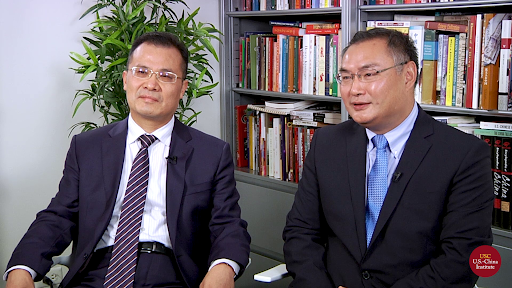Zhao Weiping (赵卫平), Vice President of the Chinese People's Institute of Foreign Affairs (中国人民外交学会), and Zhang Ping (张平), China’s consul general here in Los Angeles, visited USC on June 28, 2019 to talk about the current frictions in the U.S.-China relationship. That discussion was co-sponsored with the Asia Society’s Southern California Center. Afterwards, the two veteran diplomats spoke a bit about their work representing China in the U.S.
Zhao and Zhang are old friends whose careers have been intertwined for decades. They both hold ambassadorial rank, Zhao serving as China’s top representative in Samoa and Zhang serving in Fiji. They’ve held a variety of top positions in the North American and Oceanian Affairs Office of the Ministry of Foreign Affairs. Zhao has served as a political counselor in the Ottawa embassy and director of the Congressional Affairs office of the Washington embassy. He served as consul general in Chicago from 2013 to 2016 and served deputy head of the Sichuan provincial government secretariat before moving to the CPIFA in 2018. Zhang served in the embassy in Hanoi and as counselor at the embassy in Canberra. From 1988 to 1992, he served as deputy consul general and consul general in New York and from 2006 to 2011 he was a minister-counselor at the embassy in Washington. Zhang then served as CPIFA vice president from 2011 to 2015. He came to Los Angeles as consul general after his service in Fiji.
Zhao Weiping and Zhang Ping talked about their principal responsibilities heading consulates in America, discussed what they’ve learned along the way and offered advice to young diplomats just starting out.




